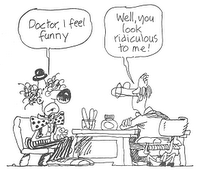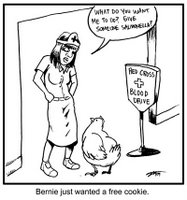One aspect of US life that is a stark contrast to UK life is the reliance on insurance policies for medical and dental treatment.
When we lived in the UK, our only insurance policies were building & contents insurance and car insurance. We knew that in the US we would have to pay medical and dental insurance, but thought that the cost would be mostly offset by no longer having to pay National Insurance. This turned out to be a false assumption because one has to pay for one's own medical and dental insurance policies as well as paying for Medicare, Medicaid and Social Security.

(Source)Medicare/Medicaid is the nearest thing that the US has to the NHS. People pay an amount each month out of their wages (I suppose, a bit like people in the UK pay National Insurance). Medicare is an insurance policy to provide medical care for those over 65 years old and some disabled people. Medicaid is a policy that provides treatment for those who are below the federally-defined poverty level.
As far as treatment is concerned, the UK media has countless nightmare stories about how people are treated on the NHS and I myself have had a few bad experiences. However, I can also say that I have seen a doctor on countless occasions (which here in the US would cost me a $15 excess for each visit) and have had a few operations/stays in hospital without having to part with a penny. If I moved house, I could just sign up at the nearest doctor's surgery.
In short, the NHS provides treatment to anyone regardless of socioeconomic status for free or near-free. Medical and dental provision (including prescribed medicines) for children is always free and most provisions for most adults is also free. Adults who earn above a certain wage have to pay for prescriptions (about £6 or so per prescription). As far as dental charges are concerned, we would visit the dentist twice a year and all I would pay for was £13 to have my teeth checked and polished. The option is available, for those who have the means, to pay for private medical provision, and private medicine does have its advantages. However, this is voluntary. One does not have to subscribe to private medicine just because one is well-off. One can still be treated by the NHS.

(Source)When we first arrived in the US, we were handed a 3" thick lever-arch folder that explained the various insurance policy options that were available to us. We were (and to a large extent still are) flummoxed. The folder was mostly gobbledygook -- containing phrases like "...subject to the deductible, covered at 80% of coinsurance of plan allowance...". Translated into our level of understanding, this says "...@!*#$ !@ #$% *$&:^?@!$# etc..." After hours of reading through this tome we were very little wiser, so we just picked a plan and hoped for the best.
It's now a year later and we still don't have a doctor. Our medical insurance only pays out if we have a doctor from their approved list. Upon phoning around the local surgeries in our area that were on the list, we discovered that:
- the list is out of date and many of the surgeries on the list do not take patients with our insurance policy and
- those doctors that do not fall under (a) have a full quota of patients and are not taking any more on.
My next recourse is to try further afield, and see if we can get a doctor in the Durham area. It's true that for $150 or so extra a month, we can choose any doctor, not just one from a pre-approved list. However, as we've been here a year and haven't needed a doctor, $1,800 a year extra seem like rather a lot to pay.
As far as dentistry is concerned, we had our first visit to a US dentist recently. There were no treatments other than prophylaxis (fissure sealant for the kids' molars (charged per-tooth), polishing, x-rays), yet our bill exceeded our insurance payout by about $750. I dread to think what it would cost
- without insurance
- if we had to have any actual treatments
In the UK, all children's treatments are free and I've already mentioned the cost of an adult's check-up and polish. Last time I had an X-ray I didn't have to pay, but even if these days there is a small fee, it'd be nothing when compared to the cost here.
When one is living in the UK one can see the NHS's problems. No matter how much public money is ploughed into it, for various reasons it is always hungry for more. It's not until one leaves the UK that one begins to appreciate just how great an ideology and institution the NHS is and how much, despite its problems, it's worth fighting to keep.



















